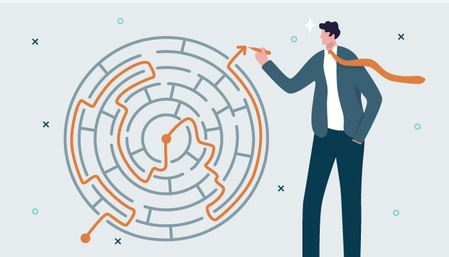


 12:59:3
12:59:3  2023-05-21
2023-05-21  1217
1217

Rowe (1985) defined the problem-solving strategy as a repetitive pattern of response used by the individual when he performs the problem-solving activity, and since this response is not directly observable, it can be identified in the "protocol" of the individual who practices the problem-solving process and conveys his thoughts in a "thinking voice" manner.
However, there is a "time" difference between the thinking processes (the mental response during problem solving) and the subsequent verbal response (in thinking out loud), which makes the thinking out loud protocol a summary of the thinking processes in solving the problem.
Hence, the term strategy can be limited to the dynamic processes that make up performance, which may consist of partial elements, but what confirms the concept of strategy is its repetition over time.
Lee (1992) indicated in his procedural definition of the concept of problem-solving strategy that this concept and the concept of problem-solving behavior are used interchangeably to refer to any response or part of a response observed by the subject during problem solving.
Despite the different ways in which the concept of problem-solving strategy has been defined, we find that there are general aspects that distinguish this strategy, most notably the following:
1- The problem-solving strategy is a complex cognitive mental process that is used to solve any problems that an individual may face.
2- This strategy is characterized by the element of repetition and modularity for a specific response to achieve the different stages of solving the problem.
3- The use of strategies over others can indicate the level of intellectual and mental maturity of individuals.
4- The strategies used to solve the problem differ according to the different individuals, according to the different problems, and according to the different stage in which the solution to the problem is dealt with.
5- It is expected that there are factors in the individual and the experiences he is exposed to that affect his adoption of strategies over others.
Reality Of Islam |
|

As air frye

A newly dev

A new lens-
 9:3:43
9:3:43
 2018-11-05
2018-11-05
10 benefits of Marriage in Islam
 7:5:22
7:5:22
 2019-04-08
2019-04-08
benefits of reciting surat yunus, hud &
 9:45:7
9:45:7
 2018-12-24
2018-12-24
advantages & disadvantages of divorce
 11:35:12
11:35:12
 2018-06-10
2018-06-10
 6:0:51
6:0:51
 2018-10-16
2018-10-16
 7:6:7
7:6:7
 2022-03-21
2022-03-21
 8:15:37
8:15:37
 2023-02-16
2023-02-16
 10:55:53
10:55:53
 2022-06-13
2022-06-13
 8:21:9
8:21:9
 2018-06-21
2018-06-21
 10:43:56
10:43:56
 2022-06-22
2022-06-22
 7:59:14
7:59:14
 2018-06-21
2018-06-21
 3:42:22
3:42:22
 2021-12-24
2021-12-24
 5:41:46
5:41:46
 2023-03-18
2023-03-18
| LATEST |